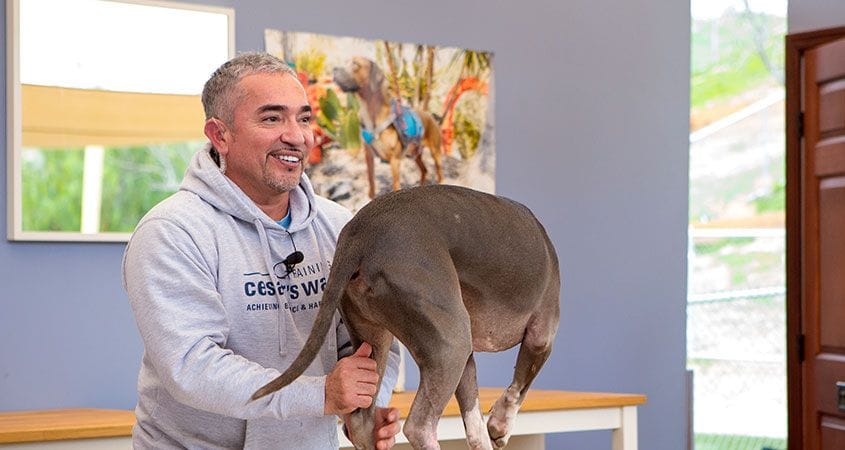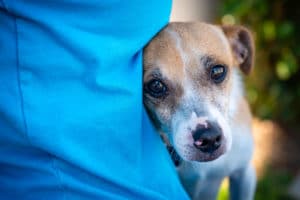One of the issues I get asked about the most is separation anxiety. It most often shows up as a dog being either destructive or excitable while the humans are away — or sometimes even while one human is away even if the rest of the pack is there.
The best solution to separation anxiety is to never cause your dog to develop it in the first place, of course, but it can be fixed if you’re willing to understand how you created the problem, and then have the patience to take the steps necessary to undo it.
What’s happening in separation anxiety is exactly what it sounds like: When your dog is separated from you, he gets anxious and acts out. So what causes it? Two words.
You do.
In the wild, separation from the pack is not normal. It’s only done to dogs that are too sick or injured to continue on, although most of the time such dogs will separate themselves or be killed outright. That’s because they’re a liability. They can slow the pack down, and they’re easy targets for predators.
So when a dog is left behind by the pack, it’s a bad thing. However, it’s different when they live in our world because you aren’t dropping them at the mall and driving away. At least, I hope you aren’t!
Dogs Should Feel Protected At Home
No, in our world, when we leave our dogs behind, we’re leaving them in the den, where it’s safe. This is where the dog pack leaves mothers and their puppies. So when you leave a dog in the den — or home — it should not be a cause for alarm. It’s a safe place. The dog should feel protected until you return. And they would, unless we make the mistake of projecting our needs and emotions onto them.
When dogs leave the den, they go and they don’t make a big deal about it. But what do we do? A lot of the time, we have to give our dogs the big human farewell. We hug them and let them lick our faces, and explain in baby speak, “It’s okay. Mommy will be right back. You stay right here, who’s a good boy?”
Now this is perfectly fine for a human child and, in fact, is probably a good idea. But that’s because humans need the intellectual assurance that you’ll be back — and they can understand it. But when you do this to the dog, it’s the equivalent of doing this to your kid:
“Oh, you’re so good. You’re wonderful. We’re going to have a big birthday party for you right now with presents and cake and everything — and it’s not here and you’re not going, bye!”
And then you breeze out the door and slam it, and your child is left sitting there feeling terrible. Don’t be surprised if you come back to find your favorite shoes flushed down the toilet or lipstick all over the living room wall… or worse.
In the case of a dog, you get the trashcans all overturned and the sofa cushions chewed up, or the back door clawed to shreds.
If you build up a dog’s excitement before you leave, then you’re basically winding a spring and letting it loose as soon as you’re not there. The secret is that you have to unwind the spring, and then you can leave and nothing is going to go off when you’re gone.
Tips For Winding Down Your Dog Before You Leave
This is why it’s so important to exercise your dog and get him good and tired before you go anywhere. Wear him out, and he’ll hardly notice you’re gone.
You also need to get her to associate you leaving with being calm, which is why you need to create a quiet, comfortable space where your dog goes to relax. It can be a comfy bed in the corner, a crate, or a spot where she likes to lie down.
And don’t forget the other important step, which happens when you come home. Again, you cannot greet your dog with excitement, because this will teach him to anticipate your return. Going back to the kid example, if you bring your child a present every time you come home from anywhere, they’re going to learn to expect it, and they’re going to be upset if they don’t get it.
That’s exactly what your dog is going to do as well. She’s going to go ballistic and jump on you and generally be hyper — and this is the state she’s going to be in when you’re gone, because she’s learned that she gets good stuff when you return.
I’ll have more to say on the subject, but those are the basics. If your dog is showing signs of separation anxiety, you need to look at how you’re causing the problem, and take steps to stop doing it.
Stay calm, and so will your dog!











